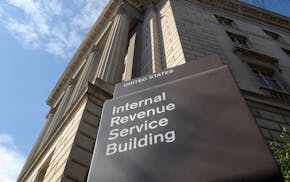Liberals tend to blame poverty on economic and political systems rigged to benefit the well-off. Conservatives tend to blame poverty on the disorganized lives of the poor themselves. New research on the brain published last month in the journal Science concurs that poor people often make poor decisions about their lives — but they do so because they're poor.
The human brain has only so much bandwidth, the study explains. That's why talking on your cellphone while driving is such a bad idea. It's why air traffic controllers preoccupied with preventing a midair collision neglect other flights. In a similar fashion, poverty imposes a heavy cumulative load on the poor, so heavy that there's too little brainpower left over to do the things that might raise their circumstances.
"It appears that poverty itself reduces cognitive capacity," the authors contend. "This is because poverty-related concerns consume mental resources, leaving less for other tasks." The study concludes that poverty's mental impact is akin to a loss of 13 IQ points, or about the difference between a normally functioning adult and a chronic alcoholic.
If correct, these results offer valuable insights into the debilitating nature of poverty, and might help explain its stubborn persistence. Perhaps it's not as easy to pull yourself up by your bootstraps as some people imagine, even in a society that offers considerable help.
The study, led by a team that included Harvard economist Sendhil Mullainathan and Princeton psychologist Eldar Shafir, employed two experiments. In the first, rich and poor shoppers at a New Jersey mall were presented an easy and a hard financial problem.
In the first scenario, shoppers were told that their cars needed repairs of $150. In the second, the repair bill was $1,500. After considering various complex options for paying those bills, the shoppers were given intelligence tests. Following the easy scenario, the rich and poor shoppers performed about equally well. But after the second scenario, with its larger financial stakes, the poor performed far worse, making the rich appear to be suddenly smarter.
A second experiment involved sugar cane farmers in India who tend to be poor before harvest and comparatively wealthy afterward. Farmers performed far worse on intelligence tests given before harvest, when they were poor, than after harvest, when they had money.
What the researchers uncovered wasn't stress in a clinical sense, but the inability to clear mental space to cope with matters other than scarcity, they said. The results were especially troubling, they said, because a narrower cognitive bandwidth is likely to exacerbate tendencies that the poor already exhibit, including less use of preventive health care, careless work habits and less-attentive parenting. The authors emphasized that they were not blaming the poor, but merely describing the effects that poverty imposes.
Poverty has stymied U.S. policymakers for decades. President Lyndon Johnson's "war on poverty" in the 1960s helped the elderly, thanks to Medicare, and stabilized many poor families. But it didn't stamp out the problem.
"Tough love" approaches from conservatives haven't helped either. Indeed, since 1980, the gap between rich and poor has steadily widened to the point that it's now wider than at any time since the 1920s.
Moreover, new census numbers show that poor people have not recovered from the Great Recession. A near-record 21 percent of low-income people are unemployed, compared with 3.2 percent of those with household incomes higher than $150,000.
It's clear that a globalized economy, coupled with advancing technology and an uneven recovery, has made poverty more intractable and employment more difficult. Untrained and undereducated men can no longer make they money they need to support families.
Women are often left alone to juggle the overwhelming tasks of raising children while struggling at low-wage jobs. Children from poor families are often ostracized by their peers if they do well in school. It's a multigenerational cycle with economic, political and cultural components. Now, with this study, there's another dimension to consider.
--------------
A Star Tribune editorial. Follow the editorial board on Twitter | Facebook | Pinterest | Google+
Readers Write: Politicized education, presidential debates, election strategies, small-town papers

Taxes increasingly paying for the past — not the future
!["Since the [Hennepin Healthcare System] Board took control in 2007, CEO pay increased by more than 142%. Meanwhile, that same board sunsetted employee](https://arc.stimg.co/startribunemedia/J7MD7DSJWMP3KYIYUSCQTABOAA.jpg?h=91&w=145&fit=crop&bg=999&crop=faces)

